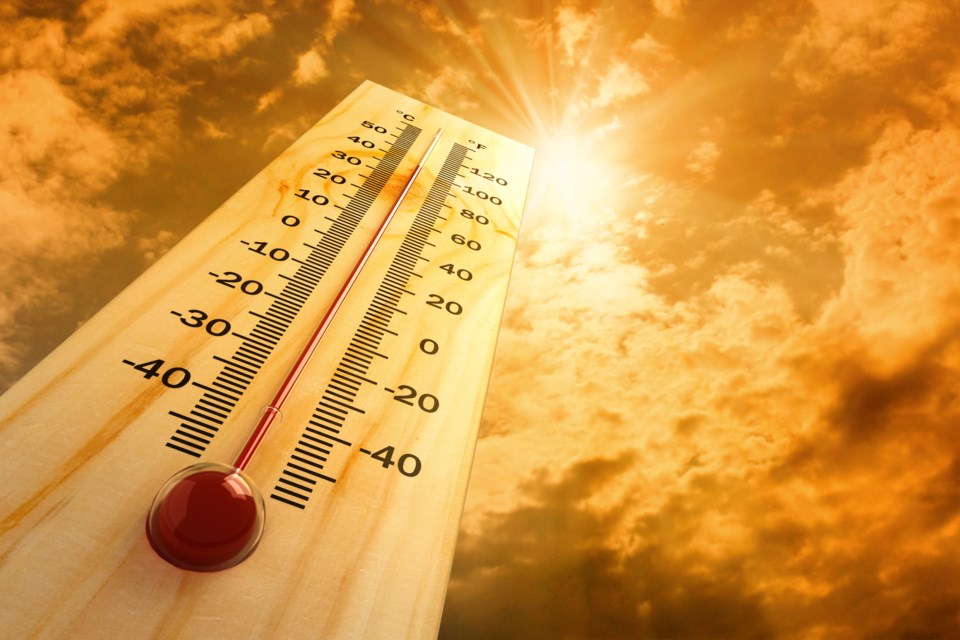As a lingering heat wave continues to make early June feel like late July, Public Health Sudbury & Districts has extended the heat warning it put in place Sunday.
The warning issued June 6 and extended until further notice impacts the following locations:
- Greater Sudbury and vicinity
- West-Nipissing, French River
- Chapleau, Missinaibi Lake
- Gogama, Foleyet
- Markstay - Warren, St. Charles
Heat warnings are issued by Environment and Climate Change Canada when the forecast rises for two days to 29 degrees Celsius or above during the day and 18 degrees Celsius or above at night, or the humidex is 36 or above.
The heavy heat is expected to continue through until Thursday when temperatures are forecasted to drop into the mid 20s, where they are expected to stay for the next two weeks.
Today, the City of Greater Sudbury issued a fire ban due to the dry conditions, pointing out the heat and dry weather is expected to continue and is already having an effect on local waterways.
“Local weather forecasts for the next two weeks show no sustained or significant rain events to help mitigate that index, and water conditions in rural area lakes, ponds, creeks and swamps are low,” the city stated in a news release.
The health unit advises that continuous exposure to high levels of heat can lead to dehydration and illnesses such as heat stroke, heat exhaustion, heat fainting, heat edema (swelling of hands, feet and ankles), heat rash, heat cramps (muscle cramps), and even death.
People who are most at risk include, older adults, infants and young children, pregnant women, people with chronic illnesses, people who are homeless, people who use alcohol or illicit drugs, and those who work or exercise in the heat. Those who take medications or have a health condition should consult their doctor or pharmacist to determine if they are at increased risk from the heat and follow their recommendations.
The health unit also advises people to check in on vulnerable loved ones, in a COVID safe manner, to ensure their safety.
“While being COVID safe, frequently visit or check-in on neighbours, friends, and older family members, especially those who are chronically ill, to make sure that they are cool and hydrated,” said Burgess Hawkins, a manager with Public Health Sudbury & Districts’ Health Protection Division.
Tips to prevent heat-related illness:
- Drink plenty of cool liquids, especially water, before you feel thirsty to decrease your risk of dehydration. Thirst is not a good indicator of dehydration.
- Babies under 6 months of age do not need extra water in hot weather; however, you might need to feed them more often. Follow your baby’s feeding cues. Encourage babies over 6 months and children to drink frequently. Offer the breast or if not breastfeeding, offer water.
- Reschedule or plan outdoor activities during cooler parts of the day. Remember to practice physical distancing to reduce the spread of COVID-19.
- Wear loose-fitting, light-coloured clothing made of breathable fabric.
- Never leave people or pets in your care inside a parked vehicle or in direct sunlight—even if the windows are down.
- Take a break from the heat by spending a few hours in a cool place.
- Take a cool bath or shower periodically, or cool down with cool, wet towels.
- Prepare meals that do not need to be cooked in your oven.
- Block sun out by closing awnings, curtains, or blinds during the day.
- Avoid sun exposure. Shade yourself by wearing a wide-brimmed, breathable hat, or using an umbrella.
- Know the signs and symptoms of heat-related illness. They include dizziness or fainting, nausea or vomiting, headache, rapid breathing and heartbeat, extreme thirst, and decreased urination with unusually dark yellow urine. If you or someone in your care experiences these symptoms, contact a health care professional, friend, or family member for help. In emergencies, call 911. If you believe that your symptoms could be related to COVID-19, contact your local testing and assessment centre.
